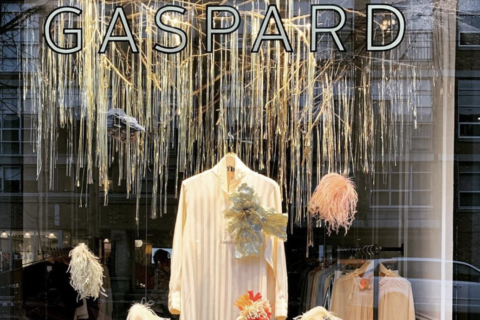Why You’ll Still See New Window Displays at Toronto’s Gaspard Boutique
"It’s important for my mental health," says co-owner Jennifer Halchuk.
While taking my daily morning walk through Toronto’s West Queen West neighbourhood, I’m consistently struck by the number of businesses that I pass that have boarded up windows. One shop that’s been a kind of oasis amid the brick-and-mortar drought is Gaspard, a boutique that focuses on selling lines from brands based in Europe and Japan.
“It’s important for my mental health, but also for our customers who miss coming to the shop,” says co-owner Jennifer Halchuk about the routine she and partner Richard Lyle have maintained in keeping their lively window dressing going.
Halchuck and Lyle, like their peers, have found online interactions now dominate their sales figures, but still having an IRL presence through changing displays could provoke an interaction. “Maybe they will send me an email,” says Halchuk of the nearby resident whose interest might be piqued thanks to a glimpse of an Antoni & Alison dress or a vibrant scarf by Inouitoosh.
Scarves from the shop were certainly in hot demand leading up to Mother’s Day last week—Halchuk says she was at the post office every day leading up to Sunday’s festivities mailing them out. But she hopes as the weather turns, shoppers will turn their attention to Gaspard’s other wares, like pieces from the new brands the store had picked up for the spring season; the names include Belgian designer Christian Wijnants, Japan’s Minä Perhonen, Paris’ Véronique Leroy, and Mii, a brand that’s owners “split their time between Brittany and Bengal.”
Another line carried in the shop is the one founded by Halchuk and Lyle over 25 years ago, called Mercy. Halchuk sees the current situation—and the fallout that will face retailers who can no longer definitively rely on importing to ensure a robust roster of pieces to sell—as an opportunity to spur on the development of a larger scope of Mercy pieces to come in the future. “We should’ve always been making more Mercy clothing, and this will probably be a catalyst that’s going to force us to do that,” says Halchuk.
For now, Halchuk and Lyle will focus on the season at hand and not losing sight of how important shopping local is to themselves and the other shops that dot my block. She notes that they’re pleased they were so active in their relationships with customers before COVID-19 struck, and that perhaps in some ways those connections have been strengthened. “The groundwork of nine years of impeccable customer service, the personal emails, all the things that we threw ourselves into is now baring fruit,” she says. “I do feel in this crisis, people in the city are asking, ‘What can I do to help?’








